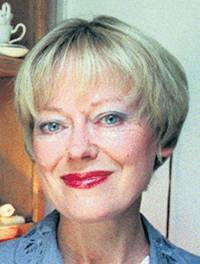
When we checked the latest Brontë news today we were taken by surprise by the death of author Claire Boylan. This was unexpected and extremely sad news.
Claire Boylan was the author of
Emma Brown, where she 'completed' the unfinished last novel of Charlotte Brontë Emma (you can read it
here). The novel was controversial and generated some discussion, but that kind of discussion that is always welcome.
According to the
Irish Independent:
AWARD-winning novelist Clare Boylan has died at the age of 58 following a long battle with cancer.
The writer, famous for her novels 'Black Baby' and 'Emma Brown', passed away at the hospice in Harold's Cross in Dublin at 6pm yesterday.
She is survived by her husband Alan Wilkes, a former deputy editor at the Irish Press where Ms Boylan worked as a feature writer.
Mr Wilkes said last night his wife had been ill for the last three years. The writer and journalist wrote 12 books, including seven novels and three collections of short stories during her prolific career.
The film 'Making Waves' was based on her short story 'Some Ladies on a Tour', and was nominated for an Oscar in 1988.
She is also famous for her novel 'Emma Brown', in which she undertook the Herculean feat of completing an unfinished 19-page manuscript by Charlotte Bronte. The novel, pieced together from the fragments Bronte left at her death, was published in 2003.
Ms Boylan expertly told the story of the mysterious heroine Emma, whose adventures on the perilous streets of mid-nineteenth century London, went far beyond Bronte's normal settings of mansions and schoolrooms. Bronte's fragment began with the intriguing words: "We all seek an ideal in life."In an article published in Newsday in 2004, that can be read
here, she gave some clues about her novel:
Four years ago, novelist Clare Boylan innocently asked a question at a literary festival in England that led to, of all things, her co-authoring a book with Charlotte Bronte.
Yes, that Charlotte Bronte, the one who wrote "Jane Eyre" and died 149 years ago.
What Boylan, 55, asked was whether Bronte would have continued writing after her 1854 marriage if she hadn't died nine months later, at age 38.
In response, Bronte biographers Lyndall Gordon and Juliet Barker told her about a two-chapter manuscript Bronte wrote just before her marriage and might have completed had she lived longer.
"I was completely captivated," Boylan says, speaking by phone from her home in Ireland. The result was "Emma Brown," which has its U.S. release (Viking, $25.95) this week. Boylan will be unable to attend; because of chemotherapy for recently diagnosed ovarian cancer, she says, her doctor advised her not to travel. Boylan tracked down the novel fragment, which Bronte called "Emma," soon after the conference. "I was more than fascinated," she says. "Here was a plain girl again. . . . It's my belief that she wanted a theme similar to 'Jane Eyre.' She was 30 when she wrote 'Jane Eyre.' Now she was 37, and she wanted a more multi-layered story, a more mature viewpoint, as well as a passionate, youthful one."
Bronte was herself "small and plain," says Boylan, "and wanted to emphasize that there was more than met the eye to a small, plain, poor woman" in both this novel and in "Jane Eyre," which follows the orphaned Jane through boarding school and a troubled relationship with her employer, Mr. Rochester.
"Everything in those days depended on money and looks. It still does. There was nobody small and plain and poor in 'Sex and the City,' was there?" asks Boylan, who discovered that, in addition to sharing initials with Bronte, she also shares a birthday, April 21.
Then there was the page "that seemed to write itself" and the time Boylan "awoke in the night with the sense of somebody looking down on me." But she doesn't want to get "fanciful," as she puts it. "It was more a metaphorical presence," she says. "This is the only book I ever wrote that didn't feel lonely to write. This one had a sense of intimacy."
It seemed as though Bronte would "rap me on the knuckles if I indulged in a simile. Charlotte never used them. I think she wanted this book finished. I felt her as a slightly edgy presence, saying 'Get on with it,' or 'No, don't do that.'She also wrote 'The Secret Diary of Mrs Rochester' for the
Poor, Obscure, Plain and Little BBC radio pieces that were commissioned in the 150th anniversary of the death of Charlotte Brontë.
Categories: Brontëites, In the News









0 comments:
Post a Comment